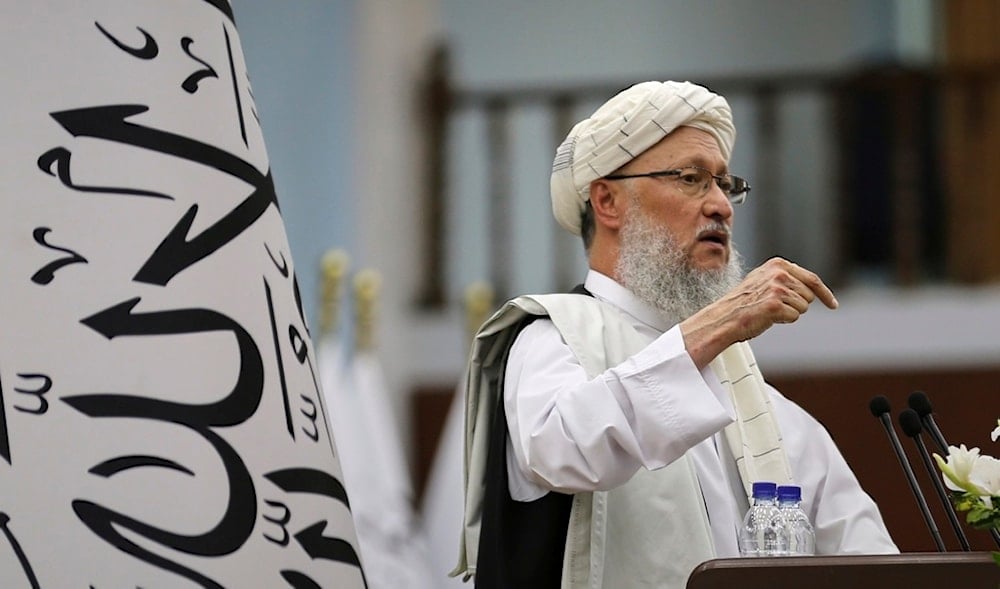Afghan deputy PM urges international recognition of Taliban-led gov.
Afghan Deputy PM Abdul Salam Hanafi calls on the global community to recognize the Taliban-led government, unfreeze assets, and support economic projects, stressing Afghanistan’s role as a regional connector.
-

Deputy Prime Minister Abdul Salam Hanafi, addresses Taliban delegates during a meeting celebrating the fourth anniversary of the U.S. withdrawal and the start of Taliban rule, at Loya Jirga Hall in Kabul, Afghanistan, Friday, Aug. 15, 2025 (AP)
Afghan Deputy Prime Minister Abdul Salam Hanafi has called on the international community to formally recognize the Taliban-led government as a legitimate political actor. Speaking at an international energy and investment event in Kabul on Saturday, Hanafi urged global powers to unfreeze Afghan assets and support the country’s efforts to integrate as a regional connector.
"Afghanistan is seeking to become a link between Central and South Asia ... The international community must unfreeze Afghan assets and recognize the Islamic Emirate," Hanafi was quoted as saying by the Afghan Irca news agency.
He stressed that countries should back Afghanistan in launching economic projects that would create jobs and provide opportunities for the country’s youth.
Economic potential and investment opportunities
Hanafi highlighted a new climate for investment in Afghanistan, insisting that the government had created conditions favorable to economic growth. He said that Afghanistan could become a hub for regional trade if its resources were fully utilized.
"Afghanistan pursues a balanced policy and strives for good-neighborly relations with all countries in the region and beyond, based on mutual respect," Hanafi said. He added that Afghanistan would not allow its territory to be used to launch attacks against any other state.
Outlining the country’s potential in the energy sector, Hanafi said Afghanistan was capable of producing more than 24,000 megawatts of hydroelectric power. Currently, around 80% of the country’s electricity comes from domestic sources, while the rest is imported from Iran, Tajikistan, and Uzbekistan.
He argued that greater foreign investment could unlock Afghanistan’s energy potential, providing power for development and strengthening its role as a regional connector between Central and South Asia.
Taliban’s rise to power
The Taliban returned to power in Afghanistan in August 2021 after toppling the US-backed government. The takeover followed the withdrawal of US and NATO troops after nearly two decades of presence in the country.
In response, many states and international organizations cut aid and froze financial assets belonging to Afghanistan, leaving the new government diplomatically isolated. Nearly three years on, the Taliban continues to press for international recognition as it seeks to stabilize the economy and assert its place in the regional order.
In July, Russia became the first country to formally recognize the Taliban-led government in Afghanistan since the group seized power in 2021.
Although the Taliban has established working diplomatic ties with China and the UAE and maintains a political office in Qatar, Russia is the first nation to formally recognize its government. Until now, no country had officially accepted the Taliban as Afghanistan's legitimate rulers.
International business activity has proceeded regardless. In 2023, a Chinese energy company signed a deal with the Taliban for oil extraction rights, signaling growing global interest in Afghanistan’s untapped resources.
Meanwhile, the Taliban is actively lobbying for recognition from the United States, particularly since US President Donald Trump began his second term earlier this year. In March 2025, the group released two American detainees, prompting Washington to lift multimillion-dollar bounties on three senior Taliban leaders.
Read more: No invader will be allowed to threaten independence, freedom: Taliban

 3 Min Read
3 Min Read










